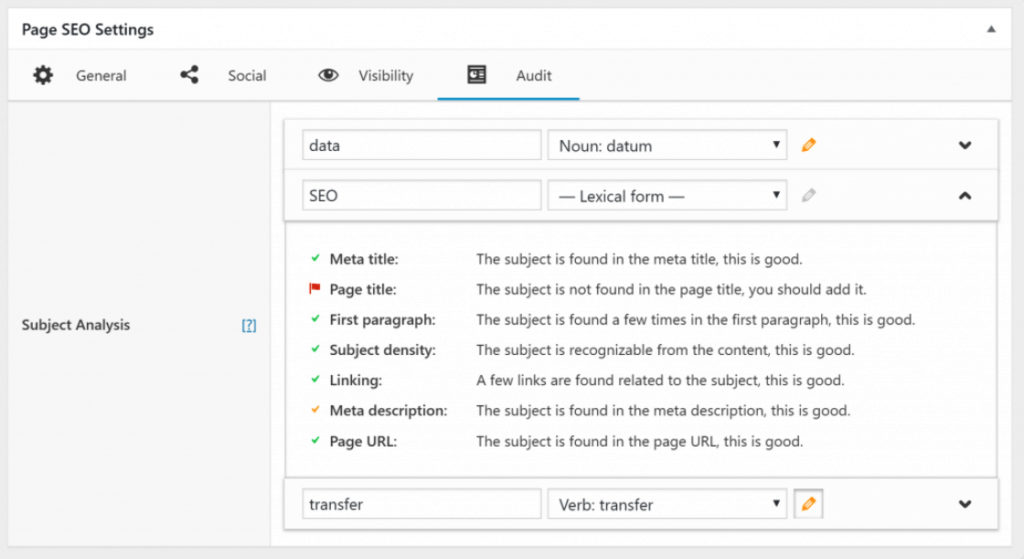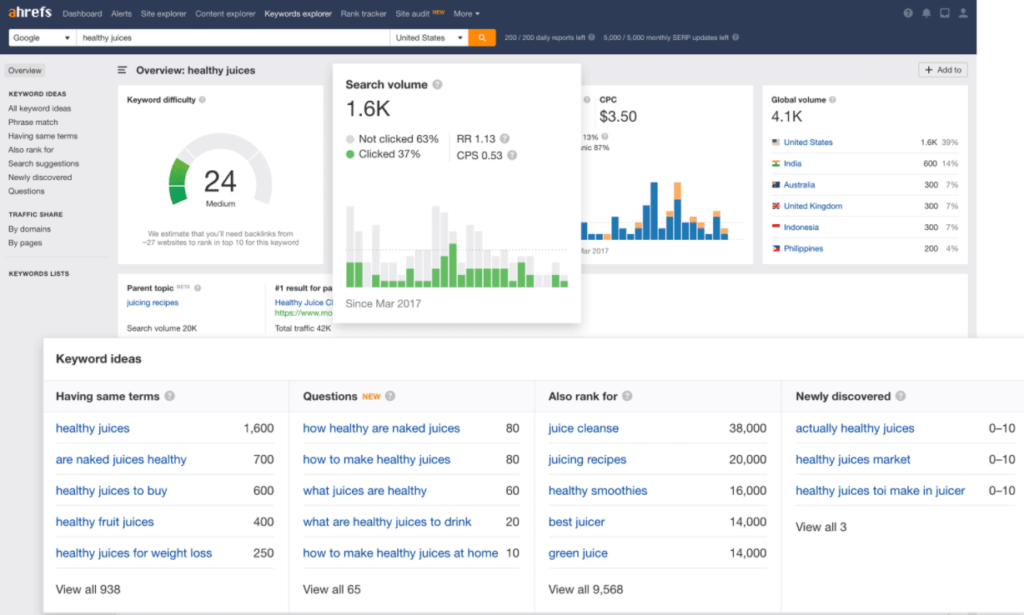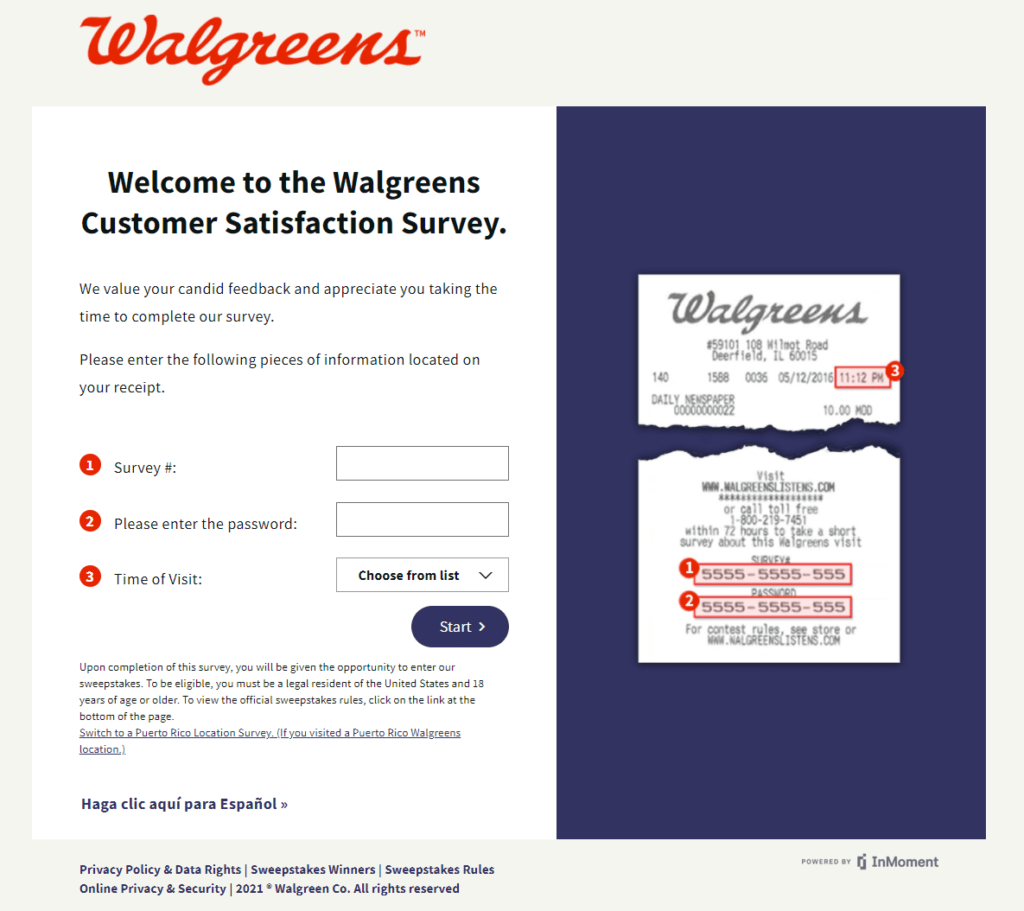Author:
James Hipkin
Publish Date:
April 26, 2021
Smart keyword research leads to keywords that can attract high-quality traffic to your website. Keywords can be a powerful marketing tool. However, the strategy required to find and use the best keyword phrases can be complex.
Fortunately, there’s a method you can apply to demystify the process. By doing some routine preemptive research, you can optimize your content’s performance and welcome interested visitors to your site.
In this keyword research step-by-step guide, we’ll introduce you to the basics of keyword research. We’ll also suggest some free and paid tools to help you along. Finally, we’ll wrap up with a few essential tips for using the results of your research to the fullest potential.
Let’s dive right in!
What Is Keyword Research?
A keyword is a term or phrase that identifies the main idea of your content. For example, an article focused on helping readers clean up their houses may have a keyword like “home organization.” These terms are essential to informing both search engines and readers about what your content focuses on.
The Complete Keyword Research Guide for Dummies – a how-to guide that demonstrates how to research and use keywords effectively for content that ranks. Share on XThe process of investigating which terms will accomplish that most effectively is known as ‘keyword research.’ During this process, you’ll look for phrases that your target audience is searching for frequently and that aren’t already dominated by websites with high domain authority.
You’ll also want to consider what your readers are hoping to find when they search for a given keyword (a concept called ‘search intent’). Accounting for your audience’s search intent means getting to the root of what they actually want from your content. Understanding this key concept can also help you conduct better relationship marketing.

How to Conduct Keyword Research
Every keyword and variation you target can have a unique impact on your marketing effectiveness. That’s why it’s important to have a flexible yet methodical approach. We recommend considering two equally important factors during your research: how competitive a keyword is and how much search volume it gets.
A keyword’s competition refers to how challenging it is to earn a top search spot in search engines for that term. Some keywords are very popular and have many creators who try to produce content about it. As more people use the keyword, your chances of ranking high generally get slimmer. For instance, it would be difficult to rank a new blog post highly for the keyword “cars.”
Search volume refers to how many people have looked for the term over a given period of time. In other words, it represents a keyword’s popularity. This number can indicate how large your audience for a certain term is and can represent potential reach.
Ideally, you’ll want to target keywords that have decent search volume but fairly low competition. This can help you maximize the impact each piece of content has.
PRO TIP: Beware the SEO snake oil salesman. They often promise page one rank. And they’ll deliver. But they do so by optimizing content for an obscure keyword phrase that has no volume. Your website has page one rank for a phrase that nobody is looking for.
The Best Tools for Keyword Research
If you’re wondering how you’ll find all of this essential information, the good news is that you don’t have to do it alone. There are a variety of free and paid tools to help you investigate keywords. The choices we present here are a starting point. You don’t need to go further but there are many, many portions available if these don’t work for you.
Free Keyword Research Tools
One of the most popular free solutions is Google Keyword Planner. You can create an account, enter a starter keyword, and get information about its search volume and competition. Google Keyword Planner will also suggest related keywords:

Alternatively, you can perform a search in reverse. The Keyword Planner will generate suggested terms for any website URL you enter. For example, here are a few of the results from the popular travel site Expedia:

This kind of investigation can provide new ideas based on the content you already have. Another strategic way to use Keyword Planner is to search your competitors’ sites and analyze their content for inspiration.
There are also free keyword tools that you can use directly from your WordPress site. For example, Yoast SEO is a multifaceted solution for improving your Search Engine Optimization (SEO), and that’s focused on keywords:

Yoast SEO offers a premium version, but the free tool is also powerful. It will analyze your posts’ SEO performance based on a focus word that you provide, and provide suggestions for making improvements. If you’re going back to optimize old content, this plugin can be a lifesaver.
To write content that ranks use the tools together. For example, you might leverage Google Keyword Planner to discover the best terms to include in your content. You could then use Yoast SEO to make sure those keywords are incorporated effectively.
Paid Keyword Research Tools
Another option available to you is purchasing a paid tool. Keywords are a booming business. As such, there are plenty of premium programs to help you with your research.
One option is SEO Framework Focus, a paid add-on for the free core plugin:

This program works similarly to Yoast SEO. However, its premium functionality goes a bit deeper. SEO Framework Focus facilitates multiple keyword usage, synonym suggestions, and a full SEO audit of each post. Plans that include the Focus extension start at $7 per month for up to two sites.
Another premium solution is Ahrefs Keyword Explorer. This tool is dedicated to facilitating extensive keyword research:

As you can see, Ahrefs Keyword Explorer offers more actionable data than Google Keyword Planner. It includes newly-emerging terms, for example, as well as the questions people are searching for that contain them.
While paid options can improve your results, they can’t guarantee success. The most important aspect of a tool is how useful you find it for your brand. Therefore, we recommend starting with the free solutions. This can help you get an idea of the features that will best serve your marketing efforts.
Tools Are Not a Strategy
Whether you opt for free or premium solutions, try to keep one thing in mind: a tool is not a strategy. With all of the data involved in keyword research, it can be tempting to believe that all you need is the right technology. However, this is rarely the case.
Research tools should help you find out what problems your audience is trying to solve. This can provide you with inspiration for high-ranking keywords. This helps to support your marketing plan, but isn’t a replacement.
Additionally, keyword solutions won’t tell you who your best customers are. If you spend all your time catering to the most popular search terms, you could be shifting away from content that was engaging loyal consumers. Conducting audience surveys can help to prevent this:

Many creators use surveys like these to gauge customer satisfaction after a purchase. However, you can also use them before you create content. When combined with your keyword research, survey results help you find topics that appeal to a large audience as well as your current user base.
How to Use Your Keyword Research (5 Key Tips)
Keyword research is just the start. You’ll want to apply your findings to every stage of the content creation process.
Doing this can help you create blog post content that ranks highly. Here are a few ways to get started.
1. Write for Readers, Not Search Bots
Some creators will put their keywords on every inch of their site, even where the terms don’t make sense. Others will hide them on parts of their sites that you’ll never see. The goal of these tactics is usually to trick search bots. This is not smart. This practice, commonly referred to as keyword stuffing, is far from a sound marketing strategy. Overuse of terms can lead to unnatural and hard to read content:

Readers will likely navigate away from an article like this quickly. Not only will users react negatively to keyword stuffing, but Google can detect it and penalize your site accordingly.
In other words, overuse of key phrases will not improve your content, either for your audience or your SEO. Therefore, we recommend that you prioritize writing quality content for your readers. Keyword use is important, but forcing them where they don’t belong is a lose-lose situation.
2. Place Your Keywords With Care
In addition to picking the right phrases, you should also consider where you’ll place them. Having too many of the same terms bunched closely together will look unnatural. Instead, try to spread them equally throughout your content.
However, the body of your post shouldn’t be the only place you use keywords. At the very least, try to include your focus keyword in the post or page’s title, image alt text, permalink, and meta description. Search engines regularly index these areas for keywords.
The SEO title and meta description, the information that appears on the search engine results page, should feature the focus keyword. Doing this helps users pick your link over others.
There are other places you may want to try and include relevant phrases. We recommend using your primary keyword in the first paragraph of a page or post, as well as in headings and subheadings. If done naturally, these placements can also help to boost your rankings.
3. Leverage Keywords During Distribution
If you’re cross-posting on social media, you can use your focus keywords to maximize your reach. For example, you can include a title and description with your post that makes use of the relevant term, or feature a direct excerpt. This will give your audience a quick understanding of the content, while also improving your SEO.
It’s also a good idea to include keywords in your permalinks:

A page’s permalink is the text on the end of its URL. Adding a keyword here will help your audience navigate your site quickly, and tell them and the search bots what they’ll be reading. It’s a simple way to make the most of your social media marketing.
4. When Doing Keyword Research, Don’t Underestimate Synonyms
If you’ve conducted keyword research and found the ideal phrase, you may feel like you need to use it at every opportunity. However, this repetition can lead to hard-to-read text. We recommend that you also prepare a list of synonyms to vary your writing.
This has two key benefits: First, it will provide your audience with a higher-quality post. Second, Google still ranks your pages for closely-related keywords. Therefore, you don’t have to resort to keyword stuffing. You can consider the following search for “great seafood” as an example:

As you can see, the first result popped up due to a match with “seafood.” However, the other results appeared in this search based on the related word “crab.” While your focus keyword should still be the top priority, using synonyms and related terms can improve your flow without sacrificing rankings.
5. Consider All of Your Website’s Content
Each post exists within the context of the rest of your website. Comments, shared articles, and other content can also factor into your SEO. Therefore, it’s important to consider your holistic site presence when choosing and placing keywords.
We suggest that you only use each focus keyword on one page of your website. This might seem limiting, but it prevents you from competing with yourself. It helps to choose terms that are specific enough not to limit future content opportunities, such as “softest blankets 2021” rather than “great bedding.”
As always, we recommend that you keep the hub and spoke strategy in mind as you’re doing this. Your website is the hub, and marketing tactics like keywords and SEO are spokes. The ultimate goal is to pick terms that will bring invested visitors to your site, rather than attracting generic traffic.
A Keyword Research Step-by-Step Guide – Conclusion
Keywords have a lot of potential. They can bring in quality traffic with a higher percentage of potential recurring customers. Fortunately, a bit of keyword research can help you leverage your phrases to best support your business.
In this article, we covered some proven ways to select optimal keywords. By understanding rankings and writing to serve your audience’s search intentions, you can improve your search engine placement without sacrificing readability.
Do you have any questions about conducting effective keyword research? Let us know in the comments section below!
Unlocking the Secrets of Keyword Research: A Heritage Grain Flour Mill Case Study
Unlock keyword research using five easy-to-follow steps.
How Website Taxonomy Can Improve Your Organic Traffic and Your Sales
How to use taxonomy to improve page rank and increase high-quality traffic.
How to Write Blog Content That Ranks (and Resonate Better with Readers)
Content that’s useful to readers is more likely to rank. Easy to say and understand, but much harder to do. We have some ideas that work for us.
Author: James Hipkin
Since 2010, James Hipkin has built his clients’ businesses with digital marketing. Today, James is passionate about websites and helping the rest of us understand online marketing. His customers value his jargon-free, common-sense approach. “James explains the ins and outs of digital marketing in ways that make sense.”
Use this link to book a meeting time with James.

